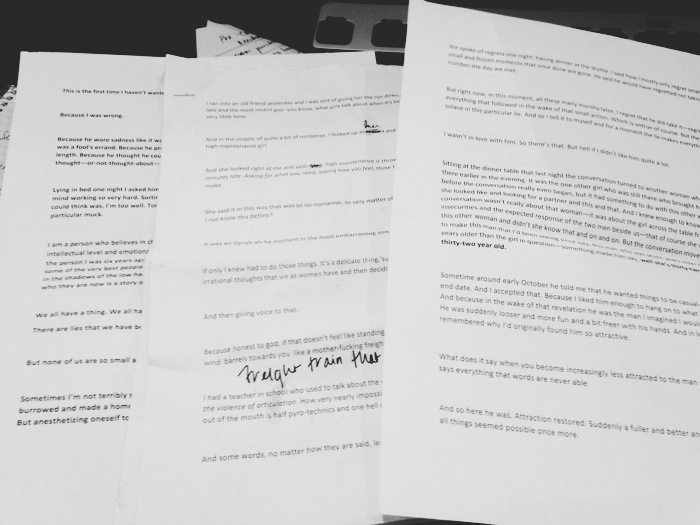We spoke of regrets one night, having dinner at the Wythe.
I said how I mostly only regret small things—frozen moments. That time last January when a man squeezed my hand and I didn’t squeeze his back. Or when I was seven and didn’t crawl into my grandmother’s lap—how sad that made her and how there wasn’t time enough to go again because life ends at different times for different people. Or when at twenty I was sad in a way that knew no words and I couldn’t muster just one—yes, when asked.
Sitting at a small table, wine between us, and not enough light, he said he would have regretted not saying hello.
But I regret that he did. Regret everything that followed after. Which is untrue of course. But there is a solace in this particular lie. And so I tell it to myself and for a moment everything is easier.
I was wrong about him. Which is a truth that is hard to sit with.
I was wrong. I say those words again and again. I feel how they sit in my mouth, how they taste, and I learn to get comfortable with them.
He wore sadness like it was a distancing thing. And spoke of attachment as though it was a fool’s errand. He lived in a perpetual state of preparation for the next-worst-thing—holding everything and everyone at arm’s length, thinking he could outsmart sadness, as though it had anything to do with thought.
Lying in bed one night I asked him a question and in the silence preceding his answer I could feel his mind working so very hard—sorting through the muck and mess. And in the space before his words all I could think was, I’m too well. I’m too well for this particular man’s particular muck…and well…fuck.
Because I so liked the way his soft curls clung to his head.
I am a person who believes in change. Personal change. On every level I believe in it—on an intellectual level and an emotional level and a cellular level. I am not the person I was eight years ago. Nor six years. Not five nor three. I’m barely the person I was a month ago, which isn’t quite true, but is true enough. And hell if I haven’t seen some of the very best people I know change—watched as they’ve struggled and stumbled and grown in the shadows of the low-hanging-trees-of-heartache. And in the space of who they once were and who they are now is a story of tremendous resilience and desire—a story of what lies-on-the-other-side—a story of what it is to be human, which isn’t an altogether easy endeavor, but a really worthy one.
I say again and again that I got out of a very dark hole with nothing but desire and the length of my fingernails. I clawed my way to a better life—grit and a wish between my teeth.
Did you know that the term cliff-hanger comes from Charles Dickens’ The Pickwick Papers?* He was writing a serial novel and the first chapter ended with a man hanging off of a cliff by the length of his too-long-for-everything-else-but-not-this-fingernails. I think often of that image—the absurdity of it. But the truth of it too. The truth lying somewhere in the man's desire.
I hung on by my fingernails, simply because I wanted to--wanted to so badly that that want became a need and the need made possible what was anything but.
If my story is remarkable, it is remarkable only in that I wanted to change—wanted a life bigger than sadness, which of course meant that sadness would have to be a part of it.
I believe we are made by what breaks us. We are forged by the dark and rocky terrain of moving-forward. And I think there’s something holy about the trudge of it—the slow movement, the body’s ability to continue on when every bit of it feels cold and still and tired.
It’s the difficulty of the journey that gives it meaning and shape.
But the genesis is in the wish, which isn’t so flimsy a thing as we think.
But you can't give that wish to a person. You can wish something for them, but you cannot wish it upon them. And you cannot get close to--or be intimate--or fall in love with a person who is so mired in their own shit that they'll do anything they can to pretend there's not a stink about it.
You can only wish them well, and walk away, when walking away is all there is to do.
*There is a chance I made this up, but I vividly recall a seventh grade lecture that explained all of this. However, the internet yielded no information that would validate this claim in any way.

